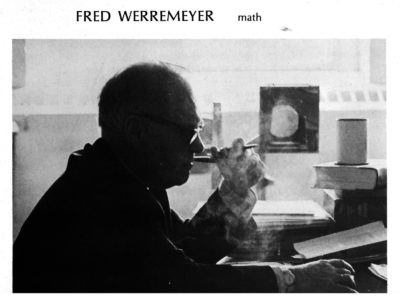Two weeks ago, some friends of mine from New York traveled to St. Louis to drop off their freshman daughter at Wash U. Her father is one of the best people I knew at Princeton, her mother his high school sweetheart who herself was a Wash U Bear back in the early ’90s. When we met up for pizza after the move-in, they told me that nine graduates from their daughter’s independent school—one of the most selective in the country—had chosen Wash U this year, and that it was a consistently popular college destination. I recalled my conversation with them when I learned two days ago that Bill Danforth ’44 had died.
The university whose leadership Dr. Danforth assumed in 1971 was transformed by the time he stepped down as chancellor in 1995. As noted in Wednesday’s Post-Dispatch tribute, “Dr. Danforth oversaw an elevenfold increase in the university’s enrollment and a dramatic growth in academic prestige. During his tenure, faculty members won 11 Nobel Prizes and two Pulitzer Prizes, and Washington U. consistently ranked among the top universities in the nation.”
Thanks in large measure to the vision and ambition of “Chan Dan,” my friend chose Wash U in the late ’80s over ostensibly more prestigious New England and Mid-Atlantic college options—a choice that would have been far less likely for someone of her eastern upbringing even one generation earlier. Now one generation later, her daughter’s same choice registers no surprise at all. Why would it? Washington University is one of the strongest educational institutions in the world.

We also mourned the passing this week of long-time Country Day and MICDS teacher Bill Werremeyer ’65—and in the process honored the legacy of his father, Fred Werremeyer, who taught mathematics at Country Day from 1930 to 1971. Bill Danforth was one of Fred’s students, a circumstance that finds me reflecting on the phenomenon of gifts by extension: Fred’s gifts as a father to his son Bill Werremeyer and the extension of those gifts to subsequent generations of Country Day and MICDS students; and, by another route, Fred’s gifts as a teacher to his student Bill Danforth and the extension of those gifts to subsequent generations of Washington University students like my friend in New York and her daughter.
Chancellor Andrew Martin recalls in his memorial to Dr. Danforth a 1988 letter to a Wash U alumnus. “What we give away always outlasts what we keep,” Bill wrote. “Pythagoras and Euclid are alive because of what they traced in the dust. We have forgotten the names of tyrants who erected monuments in their own image, but we remember Percy Shelley’s poem.”
That poem, Ozymandias, ends with these words: “boundless and bare / The lone and level sands stretch far away.” It is a hopeless vista to those who would erect monuments in their own image, but a hopeful one to those who would trace their legacies in the dust—in the “lone and level sands”—as Pythagoras and Euclid and Shelley all did. This is the lesson that the lives and love of people like Fred Werremeyer, Bill Werremeyer, and Bill Danforth have to teach us. “What we give away always outlasts what we keep.”
Always reason, always compassion, always courage. I wish you a joyful weekend with your families.
Jay Rainey
Head of School
This week’s edition of “How to Prepare for the Election Without Thinking About the Election”: Donate to Meals on Wheels, or better yet, volunteer. How much we owe to those who have come before us!
This week’s addition to the “Refrains for Rams” playlist: Just Like Summertime by Jeremy Lasley and the Lastones. The summer season officially ends this coming Tuesday. I hope you will enjoy this happy song as we bid it goodbye (Apple Music / Spotify).
